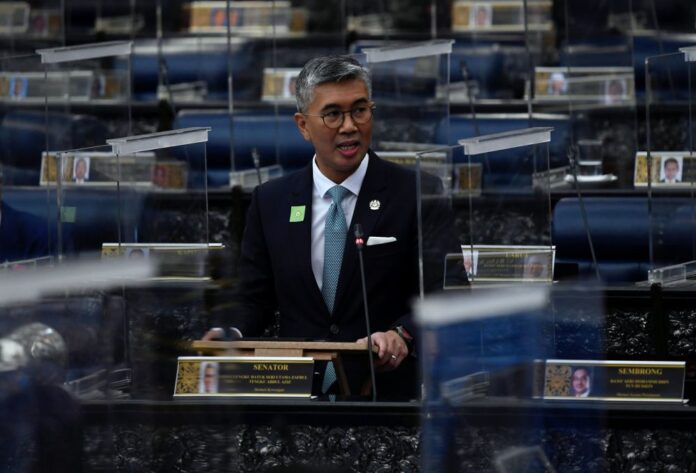Finance Minister Datuk Seri Tengku Zafrul Abdul Aziz says the government plans to intensify further knowledge-based programmes focusing on financial planning done through the concerted effort by Bank Negara Malaysia and the Securities Commission. — Bernama pic
KUALA LUMPUR, Nov 13 – The government plans to intensify further knowledge-based programmes focusing on financial planning done through the concerted effort by Bank Negara Malaysia (BNM) and the Securities Commission, Finance Minister Datuk Seri Tengku Zafrul Abdul Aziz said.
He cited the example of the BNM-organised Financial Literacy Month in October to increase the financial literacy of people from all walks of life, saying that it allowed the community to get financial planning consultation from licensed financial planners for free.
“Initiatives such as this are specifically undertaken to help the community cope with the financial management-related impact of the Covid-19 pandemic and plan all personal financial needs including preparations for retirement,” the minister said during the closing programme of the My Money & Me 2021 Financial Management Workshop organised by the Malaysian Financial Planning Council (MFPC) virtually today.
According to Tengku Zafrul, the government is putting an emphasis on the financial well-being of the youth, especially in Budget 2022 tabled on October 29.
He said discounts given on loan balances, such as for the repayment of National Higher Education Fund Corporation (PTPTN) loans, would promote and assist in better cash flow planning among borrowers, especially in facilitating debt repayments.
“The discount incentive is a government effort to inculcate a responsible debt repayment attitude and practice, which is one of the core elements in the concept of financial literacy,” he explained.
Meanwhile, Tengku Zafrul said that a study conducted by MFPC and Universiti Putra Malaysia (UPM) found a strong desire among young people aged 18 to 29 to achieve personal financial success.
Among the factors that would determine their success is financial literacy, apart from financial socialisation, self-control and financial technology (fintech), he said.
Tengku Zafrul said the rising cost of living, the effects of the Covid-19 pandemic and the previously enforced movement control order have had a major impact on the financial well-being of youths.
The study, he said, showed financial literacy, financial socialisation, self-control and fintech have a significant positive correlation to as well as direct impact on the financial well-being of youth.
He said the strongest emphasis should be given on positive financial behaviour, which is the most critical determinant of financial well-being.
“The rapid development of fintech in Malaysia is expected to contribute to improving the youths’ financial well-being,” he said.
The minister said towards this goal, the government has allocated RM300 million for the e-Start initiative – involving the provision of RM150 e-wallet credit – to encourage youths to use e-wallets.
“However, there are also financial technologies that can have a negative effect on the youth’s financial well-being such as Buy Now Pay Later (BNPL), which is attractive to them.
“Therefore, financial literacy will help them in making the right decisions to ensure their financial well-being,” he added. – Bernama


